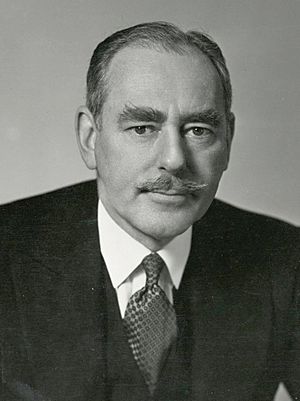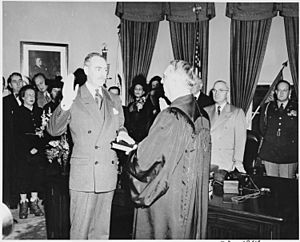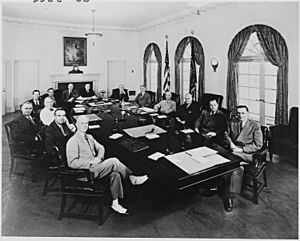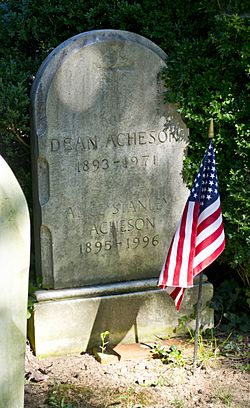Dean Acheson facts for kids
Quick facts for kids
Dean Acheson
|
|
|---|---|
 |
|
| 51st United States Secretary of State | |
| In office January 21, 1949 – January 20, 1953 |
|
| President | Harry S. Truman |
| Preceded by | George C. Marshall |
| Succeeded by | John Foster Dulles |
| 14th United States Under Secretary of State | |
| In office August 16, 1945 – June 30, 1947 |
|
| President | Harry S. Truman |
| Preceded by | Joseph Grew |
| Succeeded by | Robert A. Lovett |
| Assistant Secretary of State for Congressional Relations and International Conferences | |
| In office December 20, 1944 – August 15, 1945 |
|
| President | Franklin D. Roosevelt Harry S. Truman |
| Preceded by | Position established |
| Succeeded by | Ernest A. Gross (Legislative Affairs) Dean Rusk (International Organization Affairs) |
| Personal details | |
| Born |
Dean Gooderham Acheson
April 11, 1893 Middletown, Connecticut, U.S. |
| Died | October 12, 1971 (aged 78) Sandy Spring, Maryland, U.S. |
| Resting place | Oak Hill Cemetery Washington, D.C., U.S. |
| Political party | Democratic |
| Spouse |
Alice Stanley
(m. 1917) |
| Children | 3, including David |
| Education | Yale University (BA) Harvard University (LLB) |
| Military service | |
| Allegiance | |
| Branch/service | United States National Guard |
| Battles/wars | World War I |
Dean Gooderham Acheson (April 11, 1893 – October 12, 1971) was an important American statesman and lawyer. He served as the 51st United States Secretary of State from 1949 to 1953. In this role, he helped shape the foreign policy of the Harry S. Truman administration.
Acheson was also a key advisor to President Harry S. Truman on foreign policy from 1945 to 1947. He played a big part in creating major policies like the Truman Doctrine and the Marshall Plan. He also helped establish the North Atlantic Treaty Organization, which is a military alliance.
Even after leaving office, Acheson continued to advise presidents. He gave advice to President Lyndon B. Johnson about the Vietnam War in 1968. During the Cuban Missile Crisis in 1962, President John F. Kennedy asked Acheson for his expert advice.
Contents
Early Life and Education
Dean Gooderham Acheson was born in Middletown, Connecticut, on April 11, 1893. His father, Edward Campion Acheson, was from England and became a bishop in the Church. His mother, Eleanor Gertrude (Gooderham), was from Canada.
Acheson went to Groton School and then to Yale College from 1912 to 1915. He was a bright student and was elected to Phi Beta Kappa. After Yale, he studied law at Harvard Law School from 1915 to 1918. He did very well there, finishing fifth in his class.
Personal Life
On May 15, 1917, Dean Acheson married Alice Caroline Stanley. Alice was a painter and was very supportive of Dean throughout their marriage. They had three children together: David Campion Acheson, Jane Acheson Brown, and Mary Eleanor Acheson Bundy.
Career in Government
After law school, Acheson worked as a law clerk for Supreme Court Justice Louis Brandeis from 1919 to 1921. This was a new tradition for bright law students.
Acheson was known for his sharp mind and strong character. People saw him as a very intelligent and direct person.
Economic Diplomacy
Acheson was a member of the Democratic Party throughout his life. In March 1933, President Franklin D. Roosevelt appointed him Undersecretary of the Treasury. He had to resign in November 1933 because he disagreed with Roosevelt's plan to control gold prices. After that, he went back to his private law practice.
World War II Efforts
Acheson returned to government service on February 1, 1941, as an assistant secretary of state. He helped carry out President Roosevelt's economic plans to support Great Britain and weaken the Axis Powers during World War II.
He was involved in the Lend-Lease policy, which helped provide weapons and supplies to Great Britain. He also played a role in the oil embargo that cut off 95 percent of Japan's oil supplies in 1941.
In 1944, Acheson was the main delegate from the State Department at the Bretton Woods Conference. This important meeting helped create the international economic system after the war. It led to the creation of the International Monetary Fund, the World Bank, and the General Agreement on Tariffs and Trade.
Cold War Diplomacy

In 1945, President Harry S. Truman chose Acheson to be the Undersecretary of the United States Department of State. He worked under several Secretaries of State during this time.
At first, Acheson tried to improve relations with the Soviet Union. However, the Soviet Union's actions in Eastern Europe, Turkey, and Iran changed his mind. He then became a key architect of the Cold War policies.
Acheson often served as acting Secretary of State when the Secretary was traveling. This helped him build a strong relationship with President Truman. Acheson helped develop the policy and wrote Truman's speech in 1947 asking Congress for aid to Greece and Turkey. This speech, which warned about the dangers of totalitarianism, became known as the Truman Doctrine. It marked a major shift in American foreign policy.
On June 30, 1947, President Truman awarded Acheson the Medal for Merit.
The "White Paper" Defense
In 1949, after the Communist takeover of mainland China, there was a lot of debate about "Who Lost China?" Acheson had the State Department create a detailed report on American relations with China. This document, known as the China White Paper, tried to explain the history of diplomacy between the two countries.
The document argued that American efforts to intervene in China were unlikely to succeed. While Acheson hoped it would clear up misunderstandings, some critics used it to argue that the administration had failed to stop the spread of communism in China.
Korean War
On January 12, 1950, Acheson gave a speech where he talked about the important "defense perimeter" of the United States. He did not specifically mention the Korea Peninsula or Formosa (Taiwan) in this perimeter.
Just a few months later, on June 25, the Korean War began. Some critics believed Acheson's speech might have made the Soviet Union and Kim Il-sung think the U.S. would not get involved if they invaded South Korea. However, later research from Soviet archives showed that Acheson's speech likely had little impact on the decision to start the war.
"Loss of China" Attacks
After the Communist takeover of China in 1949, China became an enemy of the U.S., leading to war in Korea by 1950. Critics blamed Acheson for what they called the "loss of China". Acheson called this period "The Attack of the Primitives" in his memoirs.
Even though he was strongly against communism, some anti-communists criticized him for not taking a more aggressive approach. They believed his policy of "containment" (stopping the spread of communism) was too weak. Acheson and Secretary of Defense George Marshall were attacked by people like Joseph McCarthy.
Later Life and Death
Dean Acheson retired on January 20, 1953, the last day of the Truman administration. He then returned to his private law practice.
Even out of office, Acheson remained influential. He became an unofficial advisor to Presidents Kennedy and Johnson. During the Cuban Missile Crisis in 1962, Kennedy sent him to France to inform President Charles de Gaulle about the U.S. blockade.
In the 1960s, he was part of a group of experienced advisors called the Wise Men. Initially, they supported the Vietnam War. However, by 1968, Acheson changed his view. He advised President Johnson that a military victory was not possible and suggested pulling out of the war. Johnson followed some of Acheson's advice, deciding not to run for re-election.
In 1964, Acheson received the Presidential Medal of Freedom, with Distinction. In 1970, he won the Pulitzer Prize for History for his memoirs, Present at the Creation: My Years in the State Department. This book is considered one of the top non-fiction books of the 20th century.
Dean Acheson passed away from a stroke on October 12, 1971, at his home in Sandy Spring, Maryland. He was 78 years old. He was buried in Oak Hill Cemetery in Washington, D.C.
He had a son, David Campion Acheson, and two daughters, Jane Acheson Brown and Mary Acheson Bundy.
In Media
Dean Acheson has been portrayed in several films and television shows:
- In the 1974 TV show The Missiles of October, he was played by John Dehner.
- In the 2000 film Thirteen Days, he was played by Len Cariou.
Images for kids
Error: no page names specified (help). In Spanish: Dean Acheson para niños
In Spanish: Dean Acheson para niños
 | Sharif Bey |
 | Hale Woodruff |
 | Richmond Barthé |
 | Purvis Young |







